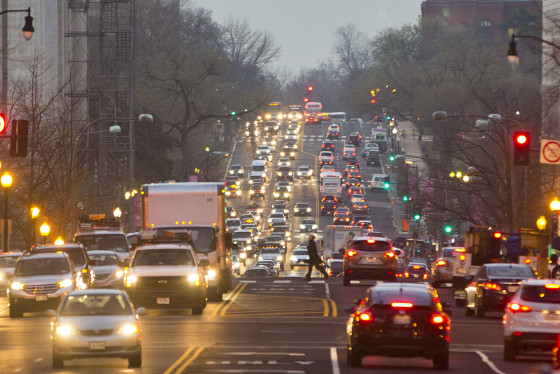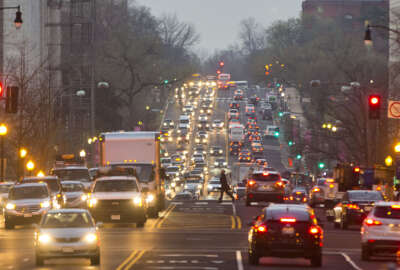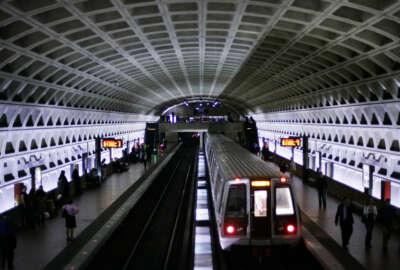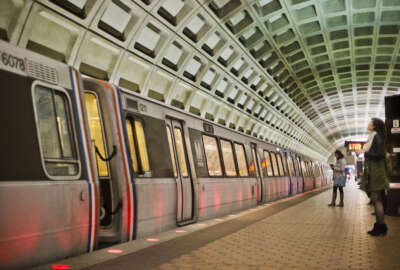
Metro under microscope as House Committee investigates oversight
Federal employees responded to a Federal News Radio survey critiquing agencies' responses to the SafeTrack program, as lawmakers question which Department of Tr...
The wandering eye of the House Oversight and Government Reform Committee has fallen on the D.C. Metrorail and its oversight by the U.S. Department of Transportation. The committee has asked the Government Accountability Office to take a look at Metro’s safety issues and whether one DoT component might be better qualified than another to handle its oversight.
Committee chairman Jason Chaffetz (R-Utah) asked GAO for details on how the Federal Transit Administration is fulfilling its oversight responsibilities with regards to the Washington Metropolitan Area Transit Authority. The letter he wrote to GAO specifically mentioned WMATA’s compliance with federal regulations, the ongoing SafeTrack maintenance, and plans for long-term investment, improvement and stability.
These questions echo the sentiments of some of the federal employees who responded to Federal News Radio’s survey about SafeTrack and how agencies are dealing with it. More than half of the respondents to the survey use the Metro to get to work. A number of them expressed satisfaction with the way WMATA was addressing safety concerns, but even more worried about the long-term maintenance and follow-through.
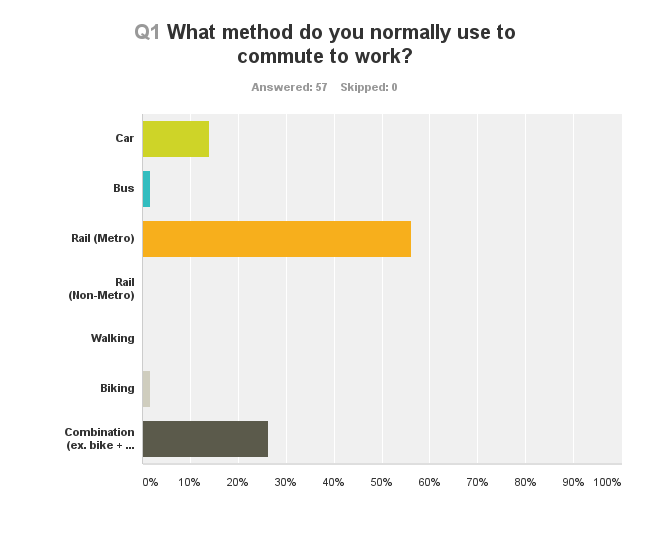
“I hope that this results in a safer system for all and that we don’t have to go through this again,” said one respondent.
The committee’s letter also requested that GAO determine the differences in the regulatory authority between the FTA and the Federal Railroad Administration, and which organizations would be more capable of overseeing WMATA.
The FTA holds oversight responsibilities over WMATA since Congress granted it to the agency in 2012. However, the National Transportation Safety Board declared in September 2015 that the FRA would be more capable than the FTA to oversee the safety practices of WMATA’s Metrorail.
“The NTSB has asked the U.S. Department of Transportation to seek authority from Congress to designate WMATA a ‘commuter authority,’ so the Federal Railroad Administration can exercise direct safety oversight,” the NTSB stated last year. “The NTSB also asked for DoT to implement a plan to transition oversight from the TOC to the FRA within six months from the date such authority is granted.”
The FRA oversees freight and intercity passenger rail systems, in addition to several urban commuter rails, through an established regulatory and enforcement system. FTA, meanwhile, regulates indirectly through state safety oversight agencies—the Tri-State Oversight Committee (TOC), in this case – and enforces its directives primarily through withholding federal funding, at least in the case of WMATA.
“The FRA has rules today. The TOC has none. The FRA has hundreds of highly trained professional railroad inspectors. The TOC has no inspectors,” said NTSB Chairman Christopher Hart.
Transportation Secretary Anthony Foxx answered the NTSB statement with a letter of his own in October 2015, saying that FTA had the necessary authorities to effectively oversee WMATA safety.
“The NTSB recommendation shifts oversight from one agency to another one, creating confusion and a greater risk of slowing down improvements,” Foxx said. “More practically, WMATA does not have an understanding or familiarity with FRA regulations, and separating their rail and bus oversight into different regulatory structures would confuse and likely delay safety improvements. Because FTA has the authority under existing law, I am directing FTA to exert federal safety oversight over WMATA Metrorail and to use every reasonable aspect of its other authorities to address this situation.”
Federal employees’ reactions to the SafeTrack program so far have been mixed. About half the respondents to the survey said that SafeTrack has made it harder than usual to get to work, but they could weather it. Only 1 percent said it was now impossible to get to the office.
Almost 60 percent of feds who responded said their agency is offering telework to help ease commutes. Meanwhile, 30 percent said their agencies have offered no options whatsoever. This was the most common complaint among respondents: the inconsistent responses from management.
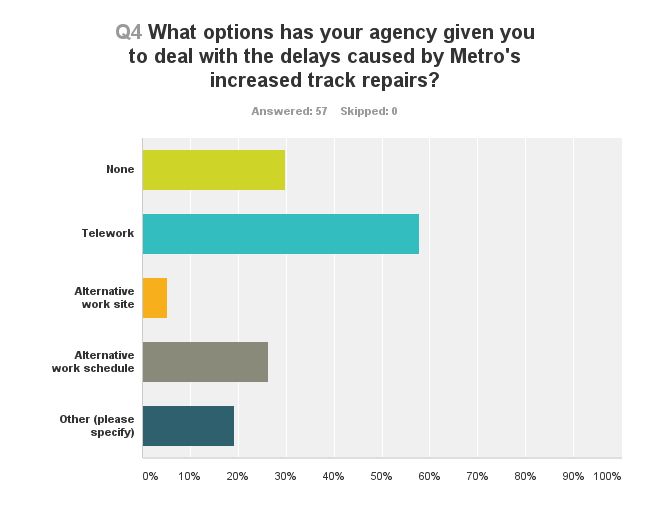
“Frankly, OPM should release a rule as management is acting quite terrible handling this whole situation. The whole metro situation is just frustrating! And most likely, this track work won’t be finished in 10 months. Trains are packed, hot, not running efficiently, it’s madness half the time in the evening. Just wish flexible telework was being enforced more by OPM for those of us that management is taking advantage of,” said one respondent.
This was not the experience of all feds, however.
“I’m just glad that Metro is trying to make the system safer for all. I can handle the inconvenience – my agency has made it very easy for me to get my work done during this time!” said another fed.
About 70 percent said that the maintenance program has increased their commute time by more than 15 minutes. Approximately 10 percent said their commutes are more than an hour longer. Less than 10 percent said it didn’t have any effect at all.
Respondents who said their agencies had given them multiple options – like telework, expanded parking, and alternate work sites and schedules – to deal with their commutes were more likely to give positive responses to the survey, despite increased commute times ranging from 15 minutes to over an hour.
“I’m affected by surges three and four. Honestly, between my adjusted work hours, additional telework and a parking space, it has been noticeably better,” said one respondent.
Copyright © 2024 Federal News Network. All rights reserved. This website is not intended for users located within the European Economic Area.
Daisy Thornton is Federal News Network’s digital managing editor. In addition to her editing responsibilities, she covers federal management, workforce and technology issues. She is also the commentary editor; email her your letters to the editor and pitches for contributed bylines.
Follow @dthorntonWFED


